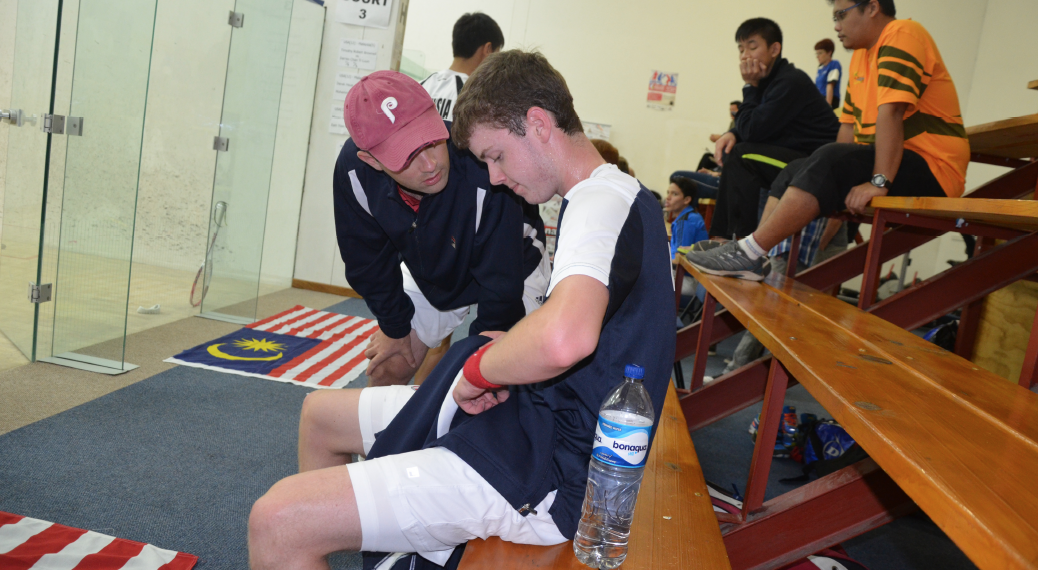
By Chris McClintick
An uncompromising desert climate with a mean altitude (5, 436 ft), higher than that of Denver (5,280 ft), welcomed the world’s best junior squash talent in Windhoek, Namibia—a nation younger than the World Junior Championships itself. The former German colony is just the second African nation to host the Championships and third consecutive first-time host following Qatar and Poland.
The runs of both top seeds, Diego Elias of Peru and Egypt’s Nour El Sherbini, were historic for contrasting reasons in the Junior Men’s and Women’s Individual Championships, which preceded the Men’s Team Championship.
El Sherbini is the sport’s youngest world champion after first winning the women’s world junior (U19) title in 2009—at just thirteen years old—and has won three more titles since. With four Women’s Squash Association (WSA) titles, El Sherbini reached world No. 4 in February 2013. In the 2013 Women’s World Championship, the eighteen-year-old shocked the world by defeating world No. 1 Nicol David in Malaysia to reach the finals where she lost to world No. 2 Laura Massaro.
El Sherbini was provided with her own shocking loss of similar proportions in Namibia. Down 2-0 against El Sherbini in the semifinals, El Sherbini’s compatriot and eventual champion, Habiba Mohamed, stormed back to win the last three games 12-10, 11-8, 13-11. Fifteen-year-old Mohamed subsequently had her own ground-breaking run on the WSA tour after her world title, in which she reached the quarterfinals of the World Series Malaysian Open as a qualifier in August, then claimed her second WSA title in September—the $25,000 Atlantis Open.
Seventeen-year-old Elias had only played his first Professional Squash Association (PSA) tournament outside of South America in January—when he reached the quarterfinals of the $15k Houston Open as a qualifier. The Lima native played six other tournaments in 2014 before the World Juniors, which included winning a $10k title as a wild card in Argentina. After his spring campaign, Elias weighed in as world No. 92 in July.
Elias’s title-run in Namibia was swift and without a game lost—the first player to do that since James Willstrop in 2002.

Elias’ Egyptian final opponent, Omar El Atmas, nearly didn’t make it past his first opponent—Team USA’s Timmy Brownell. After winning a routine opening match, Brownell went game for game with Atmas, losing in the fifth. In the following plate play, Brownell recorded three more wins before losing to Ireland’s No. 1 Michael Craig, which would be his last loss of the tournament.
From BU17 to Ninth Place
As tournament favorites, Diego Elias and Nour El Sherbini stole the headlines in the weeks leading up to the 2014 world juniors, while Timmy Brownell focused on his intense training regiment in preparation for what would be the first time he pulled on the U.S. national team jersey.
Eight months earlier, Brownell won his first Junior Championship Tour title, the Frank Millet BU17 division. After witnessing his performance, U.S. Junior Men’s National Team Head Coach Adam Hamill approached Brownell and his parents about trying out for the six available spots on the U.S. Junior Men’s team—with all six contesting the annual Men’s Individual Championship August 10-15 and the top four in the biannual Men’s Team Championship August 16-21.
National Team selection factored in that season’s top three BU19 performances in JCT’s and Nationals before the National Team playoff in April. After the playoff, the top four performances, including playoff finishing positions, completed selection.
In November, with three of five JCT’s already complete, National Team eligibility would mean forfeiting any hopes of a U17 national title and relying solely on two BU19 JCT performances, Nationals, and if he made it—the National Team playoff. In a family decision, the Belmont-Massachusetts-native chose country over individual junior glory and entered the U19 fold.
With a BU19 ranking boosted by a successful string of Gold tournaments, Brownell qualified for the West Coast JCT where he finished third. He then won the ensuing JCT in Baltimore before placing fifth in March’s Nationals. In the playoffs, Brownell’s goal became reality through a semifinal finish, after which it was announced that Brownell, along with Derek Hsue, Mason Ripka, and Max Reed, would represent the United States in the Men’s Team Championship.
Seeded twelfth ahead of pool play, the U.S. coasted through its first two pool matches against Botswana and Argentina before a final pool match against top-seeded Egypt. The U.S. conceded its first two matches against Egypt including a strong fight by Max Reed against 2013 world junior champion Karim El Hammamy with an 11-9, 11-9, 13-11 score line. Then came Brownell at No. 2 who handed Egypt their only match loss in the entire tournament.
Against eventual finalists Malaysia, Brownell kept the U.S. alive at one all, before the Malaysians closed out the match 2-1.
Brownell’s most important victory came against Colombia in the 9/12 semifinals. After Derek Hsue lost at the No. 1 position, heroics from Max Reed at No. 3 leveled the match with a five-game victory, setting up Brownell for the decider playing in the No. 2 position. Brownell clinically beat his opponent in three games and twenty minutes to reach the ninth place playoffs against higher-ranked Israel.
The U.S. found themselves down 1-0 against Israel in their final match after Mason Ripka lost at the No. 1 spot. Brownell once again stepped up as No. 2 to win a tense four-game, fifty- six-minute match to keep ninth place hopes alive. Max Reed sealed a ninth place finish recovering from a game down to win in four games.
Exceeding their seed with the help of a sensational standout tournament performance from Brownell, the U.S. marked its third best boys’ team result in the history of the tournament.


